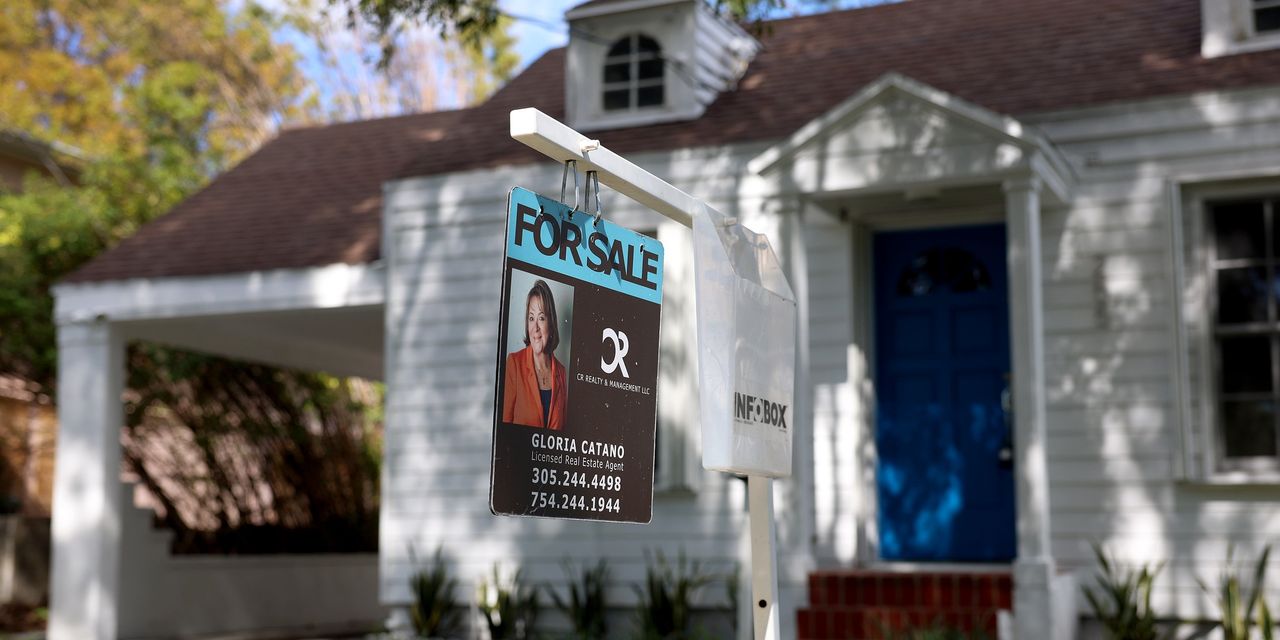U.S. consumers expect home-price growth to slow and mortgage rates to rise, according to a new survey by the New York Federal Reserve.
Households expect home prices to increase over the coming 12 months, the New York Fed said, but at the slowest pace since the survey began in 9 years.
They were also downbeat on mortgage activity: Consumers said the likelihood of them refinancing over the next 12 months fell to a record low.
U.S. consumers also expect mortgage rates to rise to 8.4% a year from now, and 8.8% in 3 years time. The 30-year is averaging at 6.54% as of Monday afternoon, per Mortgage News Daily.
The 30-year was last above 8% in the 2000’s, according to historical data from Freddie Mac
FMCC,
National mortgage rates are higher than pre-pandemic levels — and households expect them to rise even further in the future, the Fed survey added.
Consumers’ response to the question ‘What do you think the average interest rate on a 30-year fixed-rate mortgage will be?’
New York Fed
“Still, households expect that there is a 49.1% chance that mortgage rates will fall over the next 12 months, rebounding from last year’s series low of 41.8%,” they added.
Refinancing was largely off the table, the survey’s authors noted. The average likelihood of a homeowner refinancing dropped to 4.1% this year from 7.7% in 2022 — another record low.
The survey, released Tuesday, is focused on housing and is part of the broader Survey of Consumer Expectations. It collected data on consumers’ experiences, behaviors, and expectations related to housing. The housing portion of the survey has been fielded annually since 2014. The survey was fielded in February 2023.
Consumers expect home price growth to slow, but not stall
The New York Fed survey said consumers expect one-year-ahead home-price growth to fall to 2.6% this year from an average of 7% in February last year.
“This represents the lowest reading since the series’ inception in 2014,” the authors stated.
The last time the one-year-ahead price-growth expectation fell to this level was in 2016.
Yet households expect home-price growth to bounce back over a 5-year period, by 2.8% year-on-year.
Rent growth to continue stronger than home prices
Households were a little less gloomy about rents, but they still expect them to grow.
“While rent-change expectations moderated, they remain high by historical standards and in comparison to home-price growth expectations,” the Fed researchers said.
On average, U.S. households expect the cost of rent to rise 8.2% over the next year.
That’s down from the 11.5% increase they expected last year.
But over the next five years, households are expecting rent to go up by 5%.
“Households expect rent increases to substantially outpace home-price increases over the next five years,” the authors of the report added.
Renters also noted a small increase in their probability of purchasing a home in the future, rising to 44.4% this year from 43.3% in 2022, the report said. But that doesn’t represent a surge in optimism: Between 2015 and 2021, this number was mostly above 50%.
Some renters are feeling the pinch more so than others: A separate report from LendingTree said that over 8 million people in the U.S. aged 18 and above aren’t caught up on rent payments. That’s about about 13% of adult renters in America. The highest share of renters behind on payments are in New York, Nevada and Louisiana.
U.S. consumers still think it’s worth buying a home
While one prominent economist is advising consumers to put off purchasing a home by six months, many consumers think otherwise.
The NY Fed said that attitudes towards housing as a financial investment remain strongly positive. Some 68.4% of all respondents said that buying property in their zip code was a “very good” or “somewhat good” investment.
Additionally, the share of respondents who said that housing is a “bad” or “somewhat bad” investment fell — to 7.9% this year from 9.9% a year ago.
The average likelihood of consumers buying a home if they were to move within the next 3 years rose to 62.2% this year from 60.7% last year.
Read the full article here










